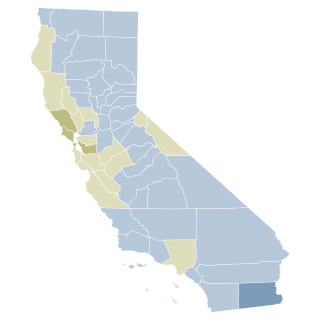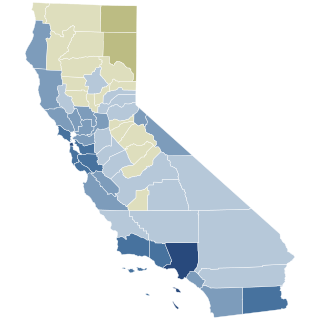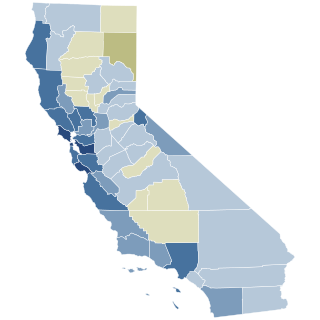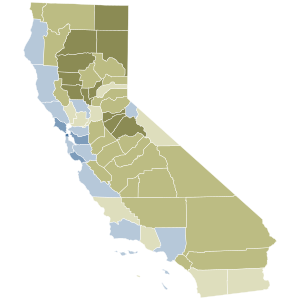
In California, a ballot proposition is a referendum or an initiative measure that is submitted to the electorate for a direct decision or direct vote. If passed, it can alter one or more of the articles of the Constitution of California, one or more of the 29 California Codes, or another law in the California Statutes by clarifying current or adding statute(s) or removing current statute(s).

Proposition 4, or the Abortion Waiting Period and Parental Notification Initiative, also known to its supporters as Sarah's Law, was an initiative state constitutional amendment in the 2008 California general election.

Proposition 11 of 2008 was a law enacted by California voters that placed the power to draw electoral boundaries for State Assembly and State Senate districts in a Citizens Redistricting Commission, as opposed to the State Legislature. To do this the Act amended both the Constitution of California and the Government Code. The law was proposed by means of the initiative process and was put to voters as part of the November 4, 2008 state elections. In 2010, voters passed Proposition 20 which extended the Citizen Redistricting Commission's power to draw electoral boundaries to include U.S. House seats as well.

California Proposition 7, would have required California utilities to procure half of their power from renewable resources by 2025. In order to make that goal, levels of production of solar, wind and other renewable energy resources would more than quadruple from their current output of 10.9%. It would also require California utilities to increase their purchase of electricity generated from renewable resources by 2% annually to meet Renewable Portfolio Standard (RPS) requirements of 40% in 2020 and 50% in 2025. Current law AB32 requires an RPS of 20% by 2010.

A California Congressional Redistricting Initiative, Proposition 20 was on the November 2, 2010 ballot in California. It was approved by 61.2% of voters. Election officials announced on May 5 that the proposition had collected sufficient signatures to qualify for the ballot. The measure is known by its supporters as the VOTERS FIRST Act for Congress.

California Proposition 19 was a ballot initiative on the November 2, 2010, statewide ballot. It was defeated, with 53.5% of California voters voting "No" and 46.5% voting "Yes." If passed, it would have legalized various marijuana-related activities, allowed local governments to regulate these activities, permitted local governments to impose and collect marijuana-related fees and taxes, and authorized various criminal and civil penalties. In March 2010, it qualified to be on the November statewide ballot. The proposition required a simple majority in order to pass, and would have taken effect the day after the election. Yes on 19 was the official advocacy group for the initiative and California Public Safety Institute: No On Proposition 19 was the official opposition group.

Proposition 39 is a ballot initiative in the state of California that modifies the way out-of-state corporations calculate their income tax burdens. The proposition was approved by voters in the November 6 general election, with 61.1% voting in favor of it.

Proposition 34 was a California ballot measure that was decided by California voters at the statewide election on November 6, 2012. It sought to repeal Proposition 17, originally passed by voters in 1972, thus abolishing the death penalty in California.

California state elections in 2016 were held on Tuesday, November 8, 2016, with the primary elections being held on June 7, 2016. In addition to the U.S. presidential race, California voters elected one member to the United States Senate, all of California's seats to the House of Representatives, all of the seats of the State Assembly, and all odd-numbered seats of the State Senate.

The Adult Use of Marijuana Act (AUMA) was a 2016 voter initiative to legalize cannabis in California. The full name is the Control, Regulate and Tax Adult Use of Marijuana Act. The initiative passed with 57% voter approval and became law on November 9, 2016, leading to recreational cannabis sales in California by January 2018.

Proposition 53 was a California ballot proposition on the November 8, 2016 ballot. It would have required voter approval for issuing revenue bonds exceeding $2 billion.

Proposition 55 is a California ballot proposition that passed on the November 8, 2016 ballot, regarding extending by twelve years the temporary personal income tax increases enacted in 2012 on earnings over $250,000, with revenues allocated to K–12 schools, California Community Colleges, and, in certain years, healthcare. Proposition 55 will raise tax revenue by between $4 billion and $9 billion a year. Half of funds will go to schools and community colleges, up to $2 billion a year would go to Medi-Cal, and up to $1.5 billion will be saved and applied to debt.

Proposition 56 is a California ballot proposition that passed on the November 8, 2016 ballot. It increased the cigarette tax by $2.00 per pack, effective April 1, 2017, with equivalent increases on other tobacco products and electronic cigarettes containing nicotine. The bulk of new revenue is earmarked for Medi-Cal.

Proposition 57 was an initiated California ballot proposition, approved on the November 8, 2016 ballot. The Proposition allows parole consideration for nonviolent felons, changes policies on juvenile prosecution, and authorizes sentence credits for rehabilitation, good behavior, and education.

Proposition 60 was a California ballot proposition on the November 8, 2016 ballot which would have allowed the California Occupational Safety and Health Administration (Cal/OSHA) to prosecute an enforcement action anytime a condom is not visible in a pornographic film. The proposition failed to pass.

The 2016 Proposition 63, titled Firearms and Ammunition Sales, is a California ballot proposition that passed on the November 8, 2016 ballot. It requires a background check and California Department of Justice authorization to purchase ammunition, prohibits possession of high-capacity ammunition magazines over ten rounds, levies fines for failing to report when guns are stolen or lost, establishes procedures for enforcing laws prohibiting firearm possession by specified persons, and requires California Department of Justice's participation in the federal National Instant Criminal Background Check System.

Proposition 66 was a California ballot proposition on the November 8, 2016, ballot to change procedures governing California state court challenges to capital punishment in California, designate superior court for initial petitions, limit successive petitions, require appointed attorneys who take noncapital appeals to accept death penalty appeals, and exempt prison officials from existing regulation process for developing execution methods.

California Proposition 6 was a measure that was submitted to California voters as part of the November 2018 election. The ballot measure proposed a repeal of the Road Repair and Accountability Act, which is also known as Senate Bill 1. The measure failed with about 57% of the voters against and 43% in favor.

Proposition 1, titled Constitutional Right to Reproductive Freedom and initially known as Senate Constitutional Amendment 10 (SCA 10), was a California ballot proposition and state constitutional amendment that was voted on in the 2022 general election on November 8. Passing with more than two-thirds of the vote, the proposition amended the Constitution of California to explicitly grant the right to an abortion and contraceptives, making California among the first states in the nation to codify the right. The decision to propose the codification of abortion rights in the state constitution was precipitated in May 2022 by Politico's publishing of a leaked draft opinion showing the United States Supreme Court overturning Roe v. Wade and Planned Parenthood v. Casey in Dobbs v. Jackson Women's Health Organization. The decision reversed judicial precedent that previously held that the United States Constitution protected the right to an abortion.















